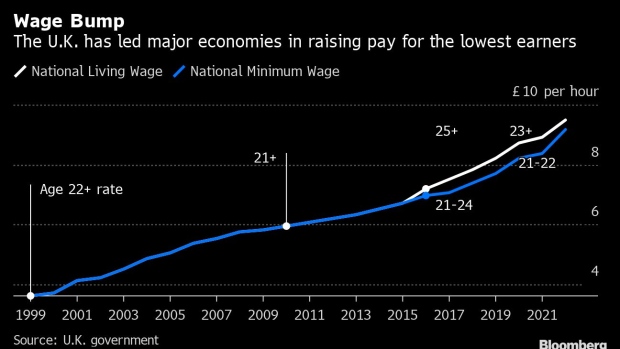Jan 26, 2022
U.K. Government Accused of Leaking Market Sensitive Information
, Bloomberg News

(Bloomberg) -- British lawmakers have accused the government of leaking market sensitive information to the media before the budget last October.
In a report published Thursday, the influential Treasury Committee called for a formal investigation after the national minimum wage rate was reported by ITV News two days before the budget.
A number measures were trailed but the announcement of a 6.6% increase in the minimum wage for those aged 23 and over constituted “inside information as defined by market abuse regulations,” the cross-party panel said.
In the build-up to the Oct. 27 budget, Chancellor of the Exchequer Rishi Sunak was accused by lawmakers of treating Parliament with contempt by briefing so many measures to the press.
In a letter to the committee, Tom Scholar, the Treasury’s top civil servant, denied that the minimum wage rise was inside information as it was “an economy-wide measure.”
However, he did not deny that the announcement was market sensitive. The Department for Business, Energy and Industrial Strategy is in charge of minimum wage policy, which would be expected to lead any internal investigation.
“The unauthorized and premature disclosure was clearly unfortunate, and should not have happened,” Scholar said. The Treasury confirmed the announcement shortly after ITV News published it on Twitter.
The Treasury Committee said “it is not unreasonable to conclude that the announcement of the change to the National Living Wage might have been market sensitive,” since the Office for National Statistics deems retrospective wage data to be market sensitive.
It argued that the release constituted “inside information” because companies with large numbers of low wage staff would be disproportionately affected.
In a statement responding to the report, the Treasury said it followed principles set out in a review on pre-budget briefings and that it didn’t pre-release the heart of the statement.
“We share the committee’s concerns that the National Living rate was leaked prior to the budget, and the government will review the arrangements ahead of future announcements,” the Treasury said.
The committee’s criticism was contained in a wide-ranging inquiry into the Autumn Budget and the Treasury’s review of departmental spending. The report also warns the government that:
- Inflation could come along with a policy of promoting high wage growth unless productivity improves and “risks contributing to a wage-price spiral”
- Tax cuts before the next election will be difficult for Sunak to achieve, since his fiscal targets give him little room for maneuver on a key goal
- The Treasury would have to “identify areas of departmental spending where he can reduce spending in real terms even if this is in the face of increased demand”
- Debt interest costs are likely to be higher than forecast because of a surge in inflation and rising interest rates, which together will force the Office for Budget Responsibility to make revisions
- “The Treasury should keep these risks at the forefront of their thinking when designing policies at future fiscal events”
©2022 Bloomberg L.P.